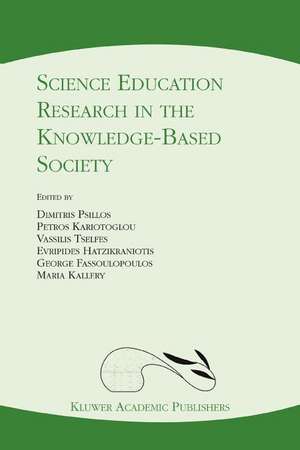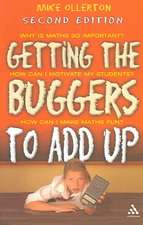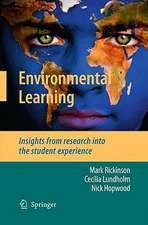Science Education Research in the Knowledge-Based Society
Editat de Dimitris Psillos, Petros Kariotoglou, Vassilis Tselfes, Euripides Hatzikraniotis, George Fassoulopoulos, Maria Kalleryen Limba Engleză Paperback – dec 2010
| Toate formatele și edițiile | Preț | Express |
|---|---|---|
| Paperback (1) | 953.97 lei 6-8 săpt. | |
| SPRINGER NETHERLANDS – dec 2010 | 953.97 lei 6-8 săpt. | |
| Hardback (1) | 961.55 lei 6-8 săpt. | |
| SPRINGER NETHERLANDS – 31 aug 2003 | 961.55 lei 6-8 săpt. |
Preț: 953.97 lei
Preț vechi: 1163.38 lei
-18% Nou
Puncte Express: 1431
Preț estimativ în valută:
182.57€ • 188.60$ • 151.94£
182.57€ • 188.60$ • 151.94£
Carte tipărită la comandă
Livrare economică 26 martie-09 aprilie
Preluare comenzi: 021 569.72.76
Specificații
ISBN-13: 9789048163373
ISBN-10: 9048163374
Pagini: 496
Ilustrații: XI, 481 p.
Dimensiuni: 160 x 240 x 26 mm
Greutate: 0.69 kg
Ediția:Softcover reprint of hardcover 1st ed. 2003
Editura: SPRINGER NETHERLANDS
Colecția Springer
Locul publicării:Dordrecht, Netherlands
ISBN-10: 9048163374
Pagini: 496
Ilustrații: XI, 481 p.
Dimensiuni: 160 x 240 x 26 mm
Greutate: 0.69 kg
Ediția:Softcover reprint of hardcover 1st ed. 2003
Editura: SPRINGER NETHERLANDS
Colecția Springer
Locul publicării:Dordrecht, Netherlands
Public țintă
ResearchCuprins
1: Theoretical and Methodological Approaches to Science Education Research.- Presidential Address: What can we reasonably expect of research in science education?.- Constructivism in science education: The need for a clear line of demarcation.- Overviews of the Research Presented at ESERA 2001.- On the methodology of ‘phenomenography’ as a science education research tool.- Conversation Theory and self-learning.- Analysis of video data of secondary school science students.- Longitudinal studies — providing insight into individual themes in science learning and students’ views of their own learning.- Changing referential perspective in science classroom discourse.- 2:Learning and Understanding Science.- Students’ positions in physics education. A gendered perspective.- Situated conceptions and obstacles. The example of digestion/excretion.- About some of the difficulties in learning Thermodynamics at the University Level.- Metacognitive Experiences in the Domain of Physics: Developmental and Educational Aspects.- How children reason from data to conclusions in practical science investigations.- Mechanistic reasoning on the concept of wave surface, and on the Huygens principle.- Atomic Physics in Upper Secondary School: Layers of Conceptions in Individual Cognitive Structure.- The electric current on its way to our house and the parallel connection of the electric appliances: primary students’ (11–12) representations.- Detailed Investigation of Professional Physicists Solving Physics Tasks.- Learning from writing in secondary science: A case study of students’ composing strategies.- Seventh-grade pupils’ epistemic views in the context of model-based instruction.- Nonlinear Analysis of the Effect of Working-Memory Capacity on Student Performance in ProblemSolving.- The Nature Of Growth In Children’s Science Understandings: Insights From A Longitudinal Study.- HOCS Problem solving Vs. LOCS exercise solving: What do college science students prefer?.- 3 :Teaching and Communicating Science.- Science and Technology Education: A high priority political concern in Europe.- A mesoscopic model of liquids for teaching fluids statics.- The importance of weightlessness and tides in teaching gravitation.- Making decisions about biological conservation issues in peer group discussion.- Discourse in the laboratory: quality in argumentative and epistemic operations.- Modelling the evolution of teaching -learning sequences: From discovery to constructivism.- Nonlinear Physics in Upper Physics Classes: Educational Reconstruction as a Frame for Development and Research in a Study of Teaching and Learning Basic Ideas of Nonlinearity.- Promoting Understanding through Representational Redescription: an exploration referring to young pupils’ ideas about gravity.- Different types of classroom debates on biotechnology. Are these simply an exercise in rhetoric or do they encourage a well-founded critical attitude?.- 4: Science Education and Information and Communication Technologies.- WISE Research — Promoting International Collaboration.- Research about the use of information technology in science education.- Physics Learning and Microcomputer Based Laboratory (MBL) — Learning effects of using MBL as a technological and as a cognitive tool.- Phenomenographical Approach to Design for a Hypertext Teacher’s Guide to MBL.- Application of a framework appropriate for a multilevel assessment of educational multimedia software in science (FEVES).- Brain Research in Science Education Research.- Computer modelling and simulation in sciencelessons: using research into teachers’ transformations to inform training.- 5: Science Teachers: Knowledge and Practices.- Exploring science teachers’ pedagogical content knowledge.- Relating research in didactics and actual teaching practice: impact and virtues of critical details.- Transforming the Standard Instrument for Assessing Science Teacher’s Self-Efficacy Beliefs (STEBI) For Use in Denmark.- Teachers’ confidence in primary science and teacher-student interactions.- Teachers’ views and attitudes towards the communication code and the rhetoric used in press science articles.- Science teachers’ perceptions of the current situation of planetary emergency.- 6: International Research and Development Projects.- A European Research Project for New Challenges in Science Teacher Training.- Quality Development Projects in Science Education.- Video-Based Studies on Investigating Deficiencies of School Science Teaching.- Authors Index.
Caracteristici
Includes supplementary material: sn.pub/extras




